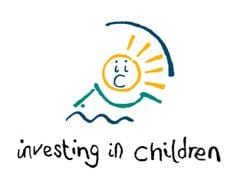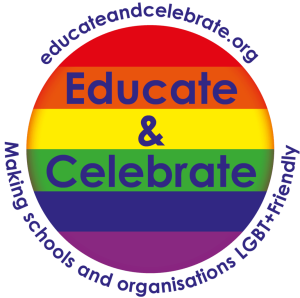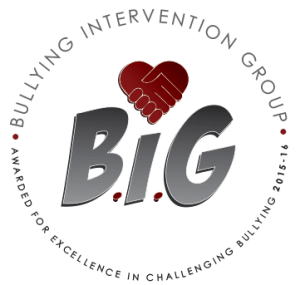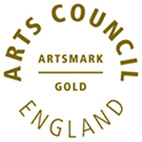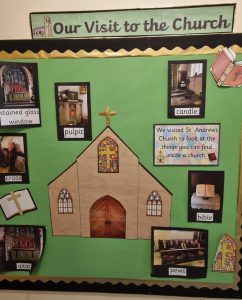
Religious Education – Curriculum Intent
Religious Education is a core aspect of the education of our children at North Park Primary School. R.E. promotes the spiritual, moral, social, cultural and mental development of pupils, and prepares them for the opportunities, responsibilities and experiences of later life. It helps pupils develop their discernment, critical thinking, reasoning and listening skills, as well as their own sense of belonging.
Critical thinking is at the heart of our R.E. curriculum. Children are given the opportunity to explore a range of concepts, building an awareness and tolerance of different beliefs, both nationally and globally. The curriculum poses challenging and engaging questions for children to consider to deepen their understanding of familiar and new religions. We encourage respect for all, including those with different beliefs and practices, as pupils develop their understanding and appreciation of our diverse society and world. The curriculum supports the work done to challenge prejudice and discrimination.
In R.E. children learn to approach questions with an open mind and accept the beliefs and opinions of others, regardless of how they differ from their own. This encourages them to explore their own beliefs and opinions and make informed choices about what they deem to be right and wrong. The curriculum encourages children to respond positively to others, with respect and empathy. Looking ahead, R.E. gives our children the basis to live, work and form respectful relationships with a diverse range of people.
In accordance with statutory orders R.E is taught according to the Durham Agreed Syllabus 2020. The R.E. curriculum provides opportunities for personal reflection and spiritual development. It is designed to broaden children’s depth of understanding of five major religions:
- Christianity
- Buddhism
- Hinduism
- Islam
- Judaism
This recognises the statutory definition of Great Britain not as ‘a Christian country’ but as ‘a country of Christianity and other principle religions’. As such R.E helps to promote the virtues of respect, tolerance and empathy, that are so important in our diverse society today.
This learning builds upon the foundations laid down in Early Years Foundation Stage where pupils are introduced to aspects of religion taught through topic, covering themes on belonging, times of celebration and special objects, people and books. These topics will use examples from Christianity and other religions.
Throughout the rest of the Primary phase pupils will build up an increasingly clear picture of
- Christianity (taught throughout KS1 and KS2)
- Buddhism (Key Stage 1)
- Hinduism, Judaism and Islam (Key Stage 2)
Our curriculum is taught in progressively planned units, delivered each week; some units focus on one religion whilst others cover themes across religions. In addition, pupils in each year group have the opportunity to build on their knowledge and understanding of Christmas and Easter in the Christian tradition through studying different aspects of these festivals each year. R.E. lesson sequences are built around a challenging question to set the scene for learning, and begin with an ethnographic context (eg videos, objects or personal stories).
The curriculum develops meaningful links for pupils by established links with the local area:
- A study of religious communities which exist in the local area surrounding the school (including different Christian denominations) (Y1, Y2 and Y6)
- The study of a Northern Saint – ST Cuthbert (Y2)
- The study of a significant religious building – Durham Cathedral (Y4)
Rich experiences are provided for all children with each year group partaking in an R.E. focused field trip, workshop or visitors to school. A wide range of high-quality religious education resources and artefacts are regularly used in the classroom to provoke interest and discussion.
The Durham Agreed Syllabus for RE
Agreed-Syllabus-for-Religous-Education-in-Durham-2020
We follow the agreed syllabus as laid down by Durham. The emphasis of this syllabus is in ensuring a wide study of the six principal religions of Christianity, Islam, Judaism, Hinduism, Sikhism (taught in secondary school) and Buddhism.
This provides the foundation for pupils to know about and understand the diversity of beliefs and practices in the society and world in which we live. Religious Education is central to good local, national and global citizenship. Religious Education must be provided for all registered pupils in maintained schools, including in Reception class.
Religious Education contributes to pupils’ education in schools by provoking questions about meaning and purpose in life, beliefs about God, issues of right and wrong, etc. The RE curriculum:
- equips pupils with knowledge and understanding of what is meant by the terms ‘religion’ and ‘worldview’ as well as knowledge and understanding of a range of religious and non-religious views.
- enables pupils to appreciate that worldviews are complex, diverse and plural and have influence on individuals, communities, societies and cultures.
- offers opportunities for personal reflection and pupils’ spiritual, moral, social and cultural development as it encourages pupils to examine the significance of their learning in relation to themselves and others.
- explore their own beliefs (whether they are religious or not), ideas, feelings, experiences and values in the light of what they learn.
- enables pupils to develop their own sense of identity and belonging.
- promotes mutual respect for the right of others to hold different beliefs, values and ideas; encouraging tolerance of others’ faiths and beliefs, a fundamental British value
In RE pupils learn about religious and non-religious world views in order to:
- discover, explore and consider different answers to questions.
- interpret, analyse, evaluate and critically respond to ideas, beliefs and practices that religious and non-religious worldviews make.
- express to express their ideas and insights, learning to discuss and to agree or disagree respectfully.
- encourages empathy and respect.
- prepare them for life in modern Britain by ensuring pupils develop their understanding of a range of political, social and moral issues that they will need to face as they grow up in an increasingly globalised world.
- help pupils to learn about and deal positively with different issues, beliefs and to challenge stereotypes and prejudice.
Aims of the Agreed Syllabus for RE
The Agreed Syllabus for Religious Education aims to ensure that pupils develop deepening knowledge and understanding about a range of religious and nonreligious worldviews so that they can:
- describe and explain beliefs and theological concepts
- describe and explain some sources of authority and teachings within and across religious and non-religious traditions
- describe and explain ways in which beliefs are expressed
- know and understand the significance and impact of beliefs and practices on individuals, communities and societies
- connect these together into a coherent framework of beliefs and practices
- gain and deploy deepening understanding of specialist vocabulary and terms
- know and understand about religious diversity within the region, as well as nationally and
globally - know and understand how religion can be defined and what is meant by the term “religious and non-religious worldviews” and with increasing clarity know that these worldviews are complex, diverse and plural
- gain and deploy skills that enable critical thinking and enquiry in relation to the material they study
- reflect on their own thoughts, feelings, experiences, ideas, values and beliefs with increasing discernment
Adobe Reader
You may need a product like Adobe Reader (free download) to view our PDF documents on our website.


